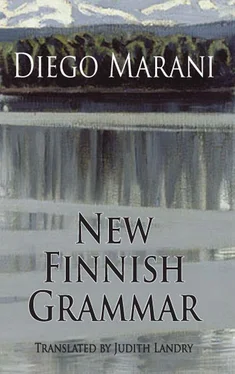I had sat down in the first free armchair to hand, beside the window, and I was staring out of it at the blinding snow. The sudden calm after those rousing songs came as an anticlimax: having been in a sense part of their group, having shared their emotion, I now felt more alone than ever. The Kämp’s usual bustle was not enough to keep my persistent anxiety at bay. My eye fell on my journalist friend, standing among a group of colleagues: he was holding forth in a language I did not know, putting forward his views in no uncertain terms, while another voice was raised in contradiction. I had no desire to throw myself into the usual journalists’ discussions, to pretend to understand sentences which remained impenetrable to me, doggedly to pursue each sound until I managed to dovetail it in beside another I already knew, and hence grasp its meaning. It seemed to me that I would never have the strength to do that again; I felt an irresistible desire to give myself up to silence and to solitude, to let the world make of me what it would, sending me to a painless death, like that of soldiers falling asleep in the snow. Folding up my jacket and placing it on my knee, I glimpsed the label with the words ‘Sampo Karjalainen’ and slipped my finger absently behind it. It was a small piece of fabric secured by four stitches of black cotton, as firm as the sutures of a wound: four stitches which were all that held my life in place. Perhaps it had been that military march which had sent my thoughts back to Trieste; those frightened soldiers, so like those with me on board the Tübingen, and those others in the woods. I had not forgotten Doctor Friari’s words; ever since my arrival in Helsinki, his advice had served as my rule of thumb, and had stood me in good stead. At first, it had seemed to work: as he had suggested, I had devoted myself systematically, indeed pigheadedly, to studying the Finnish language, I had allowed myself to be convinced that Finland was my country, that its people were my people, that those sounds were those of my own language. In moments of desolation, when my thoughts were at their blackest, I had stayed curled up before that flicker of hope, and so I had been saved. On such few clear days as there were, together with the pastor, I had gone to the headland at Katajanokka to see the sunrise, imagining that one day I too would be born afresh. It was not hard to give myself over to that universal need, the longing to belong. But my new adoptive identity remained a sham.
Each day meant starting again from scratch. The moment my attention lapsed, the moment I allowed my mind to wander, all the good work would be undone. The words stayed with me, my knowledge of the language became stronger and more rooted, but any sense of truly belonging to that place would have vanished. I had a distinct suspicion that I was running headlong down the wrong road. In the innermost recesses of my unconscious I was plagued by the feeling that, within my brain, another brain was beating, buried alive. The thought occurred to me that perhaps my sense of being permanently on the alert, my failure to immerse myself blindly in my new life, might stem from one single but serious omission. There was just one piece of Doctor Friari’s advice that I had failed to follow: namely, to give myself over to the search for a lover. Somewhere within me a shell had formed, as hard as stone and equally impenetrable; I could feel it, under my skin, as though I could touch it. It was the kernel of my new being. To crack it open, to offer it to someone else, meant jeopardizing even that little I had managed to build up, meant that those sixteen letters of my name might be blown away, scattered to the four winds. I who did not yet know who I was, how could I forsake myself so soon? Who could be worthy of my trust?
So there I was, lost in painful thought, hunched over my bundle of blue cloth, staring pointlessly into the distance, when a familiar figure took shape at the watery margins of my vision. I recognized its gait as it lingered on its right leg, body and neck thrust slightly forward, as though it were seeking permission to enter my thoughts. It was the nurse who had met me on my arrival at the hospital, the one who had introduced me to Koskela and whom I had never seen since.
‘Good evening! So it is you? From a distance, I wasn’t sure,’ she said, coming nervously forwards and making an effort at a smile.
‘Good evening!’ I answered, getting to my feet. I didn’t know whether to shake her hand, and she didn’t know whether or not to offer it. We ended up by exchanging something approaching a bow. My head was spinning, indeed I was probably reeling from too much alcohol; she must have noticed, and responded with a mixture of composure and embarrassment.
‘Where have you been all this time?’ I asked awkwardly.
‘We nurses were mobilized, sent off to Mikkeli. We were supposed to have been going somewhere else, but we couldn’t leave because of the bombing. Now we are off to Viipuri — tomorrow morning, in a troop train, to organize the refugee centre there, and … Oh, I’m sorry … how stupid I am! I wasn’t thinking … I was forgetting …’ When she spoke again it was more slowly, pronouncing each letter of each word with the utmost clarity:
‘Mikkeli is a city — a big city — and, well, that’s where we were, but …’
She was using her hands to give an idea of the city of Mikkeli. I broke in, smiling:
‘Don’t worry, my Finnish is much better now. I don’t speak it well, in fact I speak it extremely badly, but I understand much more.’
She nodded in surprise.
‘Oh, but you’re right, congratulations! I wasn’t paying attention! You’ve even got a slight Helsinki accent!’ She was pressing her small hands together, desperately thinking of something to say.
‘How about you? Still in the visitors’ quarters?’ Traces of red from her earlier embarrassment still lingered on her cheeks; as she spoke, she tried to thrust an unruly tuft of hair back under the cap from which it had broken loose, falling over her eyes.
‘Yes, I’m still there. Bed number six, by the window!’ I answered, a false note creeping into my voice. In my mind’s eye I saw the six white beds on the red-tiled floor like six snow-covered tombstones.
She gave me an apologetic look, as though she felt personally responsible for my fate. Her green eyes had darkened slightly, as did her voice when she asked me:
‘Is Doctor Lahtinen back yet?’
Within one question, I sensed another.
‘No. Now they say he is in Petsamo,’ I said, without much conviction.
‘Perhaps he can’t make it back. Travel is a problem, what with all the bombing …’ she offered by way of explanation, though she herself did not seem to believe her own words.
‘That’s right. Perhaps he never will!’ I shot back with a bitter smile. But I wanted to talk of other things; or perhaps I did not want to talk at all. I was forcing myself to be sociable, and it was taking its toll. I would have liked to find a quick way out of the entanglement, but some strange compulsion led me to carry on.
‘Why don’t we sit down?” I suggesting, pointing towards a table.
‘That would be nice,’ she replied, but she sounded indifferent, nor did she make a move. She had blushed again and was looking down at her shoes, hoping I would not notice. I felt that she was regretting ever having acknowledged me.
She was a very slight girl, and fragile-looking, unlike most of the other nurses, who looked and moved like sturdy farmers’ wives. She slipped off her cap and folded it up on her knee, running one hand quickly through her hair. The shifting colour of her eyes meant that there also seemed to be something changeable about her face: one moment she looked like a shy girl, whom I could scarcely imagine dealing with bomb-torn flesh, the next she looked like a grown woman, inured to the sight of suffering. Outside, the wind had died down and the snowflakes were drifting lightly towards the windows, settling into the spidery network of ice etched on to the panes; given a sense of warmth by the yellow glow of the candles, their white veiling offered a sense of security which was hard to resist.
Читать дальше












